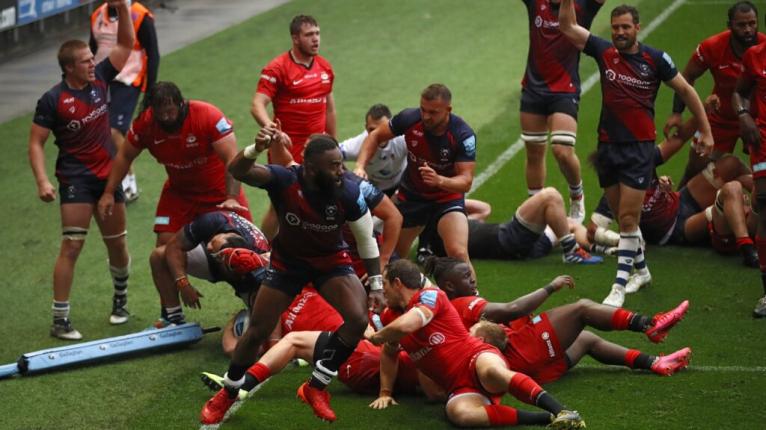Leicester Tigers, I’m told, used to have something called ‘The Front Row Club’. For all I know, they still do. Cliquish, clannish and rigidly exclusive, they used to sit together at lunch and meet up in local coffee shops to chew over whatever it is front-row forwards chew over apart from raw meat: the shortcomings of wingers, hand moisturisers, your guess is as good as mine.
Bath Rugby used to have something similar called – if memory serves – ‘The Cake Club’, a weekly gathering where Davie Wilson would routinely order a slice of carrot sponge the size of Belgium and count it as part of his five-a-day. Personally, I think these people are just sorely misunderstood but, I accept, others may disagree.
Except that ‘The Front Row Club’ were an impish, almost seditious bunch, best exemplified by the time they allegedly petitioned World Rugby to change the laws of the game so that every match would become one, 80-minute scrum. Rumour of this heresy reached me on the grapevine, so the next time I bumped into the playful Dan Cole, I asked him whether it was true, my raised eyebrow versus his inscrutable smirk. “Might be,” he said. “Why not? I mean, sod the backs.”

Sodding the backs, to digress for one moment, is by no means an unusual sentiment in the netherworld of the scrum where the front row’s view of the wider rugby firmament – necessarily, you could argue – isn’t always global. I once asked a formidable loosehead of the same era to what extent the context of a game had any bearing on his sense of self-satisfaction at the final whistle; namely, if you’d travelled to the backside of France for a meaningless Challenge Cup tie, lost 46-10, seen your full-back carried off with a broken leg, had your flight home cancelled in a snowstorm and yet – crucially – you’d had a nudge on in the scrum and eked out a couple of penalties, would you consider that a worthwhile weekend’s work? “Absolutely,” he said. “But I’d probably keep that to myself.”
I’m not whining about the rolling maul’s place in the game, merely its prevalence. As the family Alsatian once discovered when he helped himself to an unguarded packet of chocolate digestives, it’s possible to have too much of a good thing.
Look, I’ve no idea whether The Front Row Club’s pert petition ever existed or, if it did, what became of it. But whichever log fire or wastepaper basket World Rugby filed it in matters not one jot given hairy-arsed forwards have effectively taken over the game anyway courtesy not of the match-long scrum but of the rolling maul. Enough already: it’s not quite rugby’s homage to ‘Bodyline’ but, as a spectacle, it’s about as compelling as coastal erosion.
In all fairness, I should declare a small prejudice here given I’ve a life-sized poster of Romain Ntamack on my bedroom wall and once, back in 1996, I took a pee in a Hong Kong toilet two stops down from Christian Cullen: unquestionably, the highlight of my career. But you don’t need to be an inconsequential, ineffectual – almost effete – former threequarter such as myself to realise that the game has got slightly out of whack. Besides, I can scarcely recuse myself from my own article.
I grant you, there’s an art, even a beauty, to the catch-and-drive; choreography, nuances and no small measure of grunt and nous (watch, if you will, the elongated, French variant that totally bamboozled the All Blacks in Paris last month; tactically astute, technically sublime). And just to be clear, I’m not whining about the rolling maul’s place in the game, merely its prevalence. As the family Alsatian once discovered when he helped himself to an unguarded packet of chocolate digestives, it’s possible to have too much of a good thing.

As I write, two of this season’s top four try-scorers in the Gallagher Premiership – Agustin Creevy and Nic Dolly – are hookers; casting the net a little wider, both Malcom Marx and Bongi Mbonambi have each scored more Test tries for the Springboks than Cheslin Kolbe, Lukhanyo Am, Damian de Allende, Handré Pollard, Faf de Klerk and Cobus Reinach; what’s more, Peato Mauvaka – alone – snaffled as many tries as the entire French back division in Les Bleus’ Autumn Internationals. For a game that likes to wallow in its more romantic ideals, the rolling maul has become rugby’s answer to marital sex.
Clearly, the sport’s great selling point has always been its infinite varieties; an evasion game, yes, but at the same time a contest between irresistible forces and immovable objects. More than this, forwards engaging forwards – theoretically – opens up first-phase space for backs and, no question, the looming threat of being on the receiving end of a well-oiled catch-and-drive stops cynical teams coughing up lazy, inexpensive penalties in what the Harlequins coach Nick Evans calls ‘Middle Earth’. I get it.
If a team perfect a cast-iron, catch-and-drive routine, the head coach isn’t going to weep too openly if the opposition can’t handle it.
But the rolling maul is still a rat’s nest, a bugger to referee and even harder to defend. I once spoke to a head coach who ruefully admitted that chicanery was often the only way of avoiding the almost inevitable strangulation; testing the referee’s peripheral vision and patience, weighing up when he might head under the sticks or reach into his pocket and, in the best-case scenario, hoping he blows the call and you get a cheap turnover. Tumbling the dice with the referee – the ‘let’s-give-them-three-and-not seven’ gambit – is often the last resort for any arse-to-the-wall, sandbag-lunged, goal-line defence but when it potentially becomes your first port of call, we’re in danger of losing the plot.
It’s tough to point any fingers here. Ends invariably trump means – the more so in the professional game where results define and often determine careers – so if a team perfect a cast-iron, catch-and-drive routine, the head coach isn’t going to weep too openly if the opposition can’t handle it. Put it this way, if you’ve got Louis Rees-Zammit on your team-sheet, you’re not going to ask him to shift down a gear or two to give those eating his dust a chance to catch up; the onus, clearly, should be on the defence to shape up and shut it down.
But how? The great sine qua non of rugby union is that it should be a contest for possession; the question being, is this true if you’re defending a catch-and-drive? Well, technically, I suppose it is. You can (a) compete for the ball on the throw (b) sack the jumper once he has landed and before the maul has formed (c) ‘swim’ through the bodies to the shallow end and drown the ball carrier or (d) tighten your collective girdle and shove the opposition into the one-and-ninepennies. Theoretically, there are options.

But, in practice, how effective are they in the face of a well-drilled rolling maul? And, crucially, could you employ all of those options simultaneously? The honest answers to these questions would probably be ‘not very’ and ‘don’t be silly’; indeed, each is too often a singular gamble, which is precisely why the catch-and-drive is such a ubiquitous and successful tactic and why strategic skulduggery is such a common defensive ploy.
And which is also precisely why the lawmakers need to take a broader view, the more so when showpieces such as the 2021 Lions Test series in South Africa turn into a cure for insomnia; to wit, two Lions tries both scored by hookers. Now, you could legitimately put that down to dull coaching but it’s happening far too often; 95% of all penalty tries, I’m reliably informed, come from rolling mauls and no other ploy on the pitch is better guaranteed to produce points. A game which offers multi-dimensional attacking options is, too often, being too heavily influenced by just one.
You could restrict the rolling maul to those contesting the lineout, which would prevent the spectacle turning medieval, a sort of Shrovetide football where two neighbouring villages spend three days wrestling over a pig’s bladder.
The best analogy here, perhaps, would be Her Majesty’s Revenue & Customs, not everyone’s favourite people but worthy of a grateful round of applause on those all-too-rare occasions they shut down loopholes exploited by tax avoidance specialists when they’re starting to make significant dents in The Exchequer. In this spirit, World Rugby took action against both ‘The Latch’ and ‘The Peeled Onion’ and, as I hear it, the microscopes are even now poring all over ‘The Crab’; sharper minds than mine – and there’s no shortage of those – now need to take a critical look at the catch-and-drive.
For a start, you could restrict the rolling maul to those contesting the lineout, which would prevent backs piling in and the spectacle turning medieval, a sort of Shrovetide football where two neighbouring villages spend three days wrestling over a pig’s bladder. This would certainly get my vote and, I suspect, a fair few forwards would be in the same lobby: there’s little an honest prop detests more than being forced to share the credit for his blood, sweat and graft with an 11st winger.
Secondly, you could entreat the officials to make a significant shift in, if you like, the focus of liability given that, as one eminent coach confided, “50% of attacking mauls are illegal”. Have the lifters, for example, created a safe haven for the jumper to land by skewing in and thereby blocking any meaningful, defensive engagement; has there been a ‘long arm’ transfer from the jumper or are defenders being shackled into a dead maul to prevent them from intercepting a ball carrier who’s now in open play? Much as ‘the team of three’ is – rightly – encouraged to favour, positive, attacking intent, it’s very rarely just the defenders who’re testing the officials’ eyesight in a rolling maul.
But the major bugbear is that, too often, a rolling maul doesn’t actually do what it says on the tin, namely, roll. If it starts moving, then stops, the attacking team get five seconds to ‘use it’ which, crucially, includes reigniting the shove. If it stalls again, then, and only then, does the ball have to emerge. I’ve never understood this; indeed, simply removing this second bite of the cherry would make a huge difference and, arguably, even up the balance of the contest.
Of course, the counter-argument would be that if the rolling maul stalls, the ball’s still ‘live’ given it hasn’t gone to ground, therefore restarting the maul is, without doubt, ‘using it’. But if you accept that, then why doesn’t the attacking team get three, or four, or 10, or 20 opportunities to reboot a static maul instead of just the one; in other words, if a line has got to be drawn somewhere, then why not earlier? This way you offer the defence a fairer reward for thwarting the opposition’s momentum and the attack a greater challenge to exploit their dominant position; again, if you like, a truer balance.

Look, there are more viewpoints on this than there are self-serving hypocrites in the Cabinet. I cold-called four horses’ mouths this week on the subject of the catch-and-drive and – good as it was to touch base – I got four significantly different takes on (a) the extent of the problem (b) the causes of the problem, (c) the solutions to the problem and (d) whether there was even a problem at all.
One concern, I suppose, would be that every tweak to the laws, almost inevitably, provokes unintended consequences – unknown unknowns – which, equally inevitably, beget further tweaks and further unintended consequences until, as one of my stable of rugby thoroughbreds eloquently put it, you end up trying to turn toast into bread.
You could strip this back even further and argue that the sacred contest for possession is, in itself, a hefty misnomer and that what we’re really talking about here is not a contest for possession per se but a contest for quality of possession. Trust me, the deeper you delve into the heart of the issue, the darker it gets and however many malt whiskies you sink to deaden the pain, you begin to feel like Martin Sheen upstream on the Nung river in a rigid-hulled PBR and a haze of napalm: if you like, Apocalypse Maul.
Look, we absolutely and unarguably need to retain the catch-and-drive but its intricacies and its impact deserve a reinspection. Back-breaking amounts of work – quite rightly – have gone into the safety aspects of the scrum and speeding up ball at the breakdown; right now, the rolling maul needs a fresh perspective, that or we could simply revisit The Front Row Club’s petition and opt for one, 80-minute scrum. Frankly, it might almost be preferable.


Both amusing and well informed, thank you!